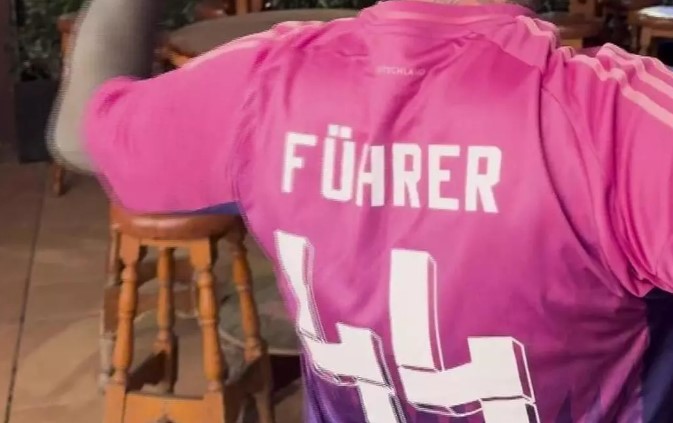Despite police operations, the sale of Nazi jerseys on Playa de Palma remains a thriving business. Now, a new “Führer” model has surfaced. One reason why these provocative souvenirs are still available.
Those who spend their vacation in Mallorca usually want to relax or party wildly – but in any case, escape from everyday life. Perhaps also to leave the politically complex and frustrating global situation behind. But right-wing extremist ideology apparently doesn’t stop even at Germany’s most popular vacation destination.
The trade in Nazi jerseys on Playa de Palma is booming. Despite repeated police operations and legal gray areas, the sale of these jerseys has established itself as a lucrative business model in recent years. A new “Führer” jersey has recently surfaced. A dealer reports on the business with right-wing extremist ideologies.
Football jerseys have long been available at the well-known vendor stalls in Palma – but certain models stand out in particular: the pink shirt with the inscription “Führer” and the number 44, reminiscent of SS runes. These have been seen in various media reports and on social media. Compared to “regular” jerseys, which sell for around €20, the Nazi jersey is significantly more expensive at €27.
“Selling it is riskier,” one vendor explains in an interview. There are repeated complaints from vacationers who are outraged by the jersey and alert the police. Nevertheless, according to him, the shirt remains a best-seller.
Demand for such provocative souvenirs seems to remain high in Mallorca. Apparently so much so that vendors have expanded their offerings: According to the “Mallorca Zeitung,” in recent weeks not only jerseys with the number 44 have appeared, but also models with the number 88.
The number 88 is considered code for “Heil Hitler” in right-wing extremist circles, as the letter H occupies the eighth position in the alphabet.
Legal gray areas allow sales in Mallorca
Although these new jerseys continue to cause a stir, vacationers are also regularly outraged by them.
Legally speaking, the sale of these jerseys is not fundamentally illegal in Spain. From a legal perspective, their sale in Mallorca is only prohibited for trademark reasons. The display of Nazi symbols is only punishable if it is associated with calls for violence or discrimination. In Spain, the law is interpreted differently in this regard than in Germany. However, street sales are also prohibited in Spain, which repeatedly leads to police interventions.
Despite frequent checks and the closure of stalls selling the jerseys, the trade in the right-wing extremist shirts remains a widespread phenomenon.
One seller explained: “A lot of people buy the jersey, especially Germans. They think it’s funny. It’s not good, but I make money with it. They often even pay more than for the other jerseys. If the police come, I have to hide it immediately because they get angry when they see it.”
Just a few weeks ago, a German vacationer made headlines when he proudly appeared in front of the cameras wearing his “Führer” jersey. In a video, the drunken man declared: “I’m in Mallorca, boy, and I’m wearing a Führer jersey, and it’s just awesome.” The incident, which was shown on MallorcaTV, sparked a heated discussion on social media. Here, too, it becomes clear that the sale of these jerseys is met with widespread outrage, but at the same time, it attracts some vacationers.
Similar discussions have also taken place in German football. In spring 2024, the font used for the number 4 on the German national team’s jerseys caused a stir. The number was reminiscent of the runes of the SS and led to a public outcry. Adidas and the German Football Association (DFB) reacted quickly and stopped the possibility of personalizing the number 44 on jerseys.




